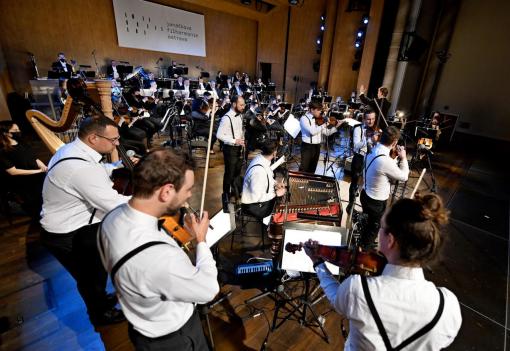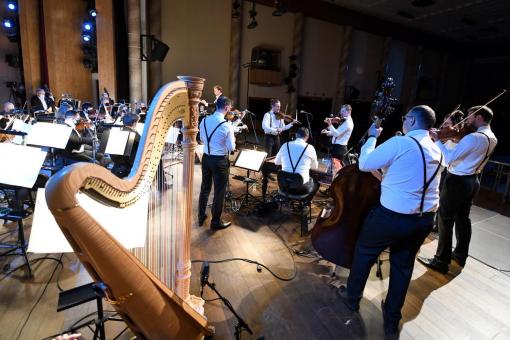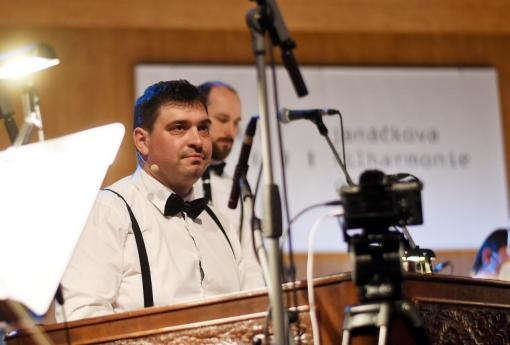More than twenty years ago, the Harafica cimbalom ensemble was founded at the Primary School of Arts in Uherské Hradiště. For most music fans, it is known for its unusual arrangements of folk songs, excellent performances of musicians, sold-out concerts, but also unusual fusions of genres. And it was about their latest cross-over project that I talked with the musical director and cimbalom player of Harafica music, Peter Gablas, from whose pen all the musical arrangements can be heard in it. It is their new album, which is called Harafica Symphonic. Connecting traditional folk music with the powerful sound of the Janáček Philharmonic Ostrava with the Brno conductor Robert Kružík. You can hear old texts from the collections of František Sušil, Janáček motifs and the singing of two interesting guests.
Petr, for some time now, listeners can hear very unusual and interpretatively demanding arrangements of folk songs in your repertoire. Was that the direction you wanted to take from the beginning?
It wasn’t. We all come from Uherské Hradiště and the surrounding area. And we got that foundation right here, and that’s basically what we’ve been building on to this day. We were founded at the local primary school of arts, so we automatically played in the Hradišťánek ensemble and got the repertoire basis here. We learned how to play to fit the dancers’ feet movements, we learned different styles.
When we became independent, the responsibility for dramaturgical direction and writing fell to me. We have enjoyed experimenting since the beginning. This is not to renounce where we grew up and what we have been through. We respect it, we build on it and we proudly claim it. And then professional life stepped in. I took up the career of a musician. I studied at the conservatory, then worked as a musical director and came into contact with various ensembles, musicians and genres. For me, all this is an inspiration. Then when I work with a song, I have to have some kind of impulse and everything evolves gradually. We are proud of where we grew up and we try to build on that.
Are you inspired by a particular musical ensemble or person, or do you try to invent new things?
I am inspired by many people. It also has to do with who I might have had the opportunity to work with. Whether based on classical music with different orchestras e.g. Opera Diversa. Or music direction at the Prague Academy, where I made recordings of various ensembles, both chamber and orchestral ones. You get a little glimpse under the hood of the composer’s craft and try to draw from it. I like Janáček very much. Overall, he is close to me in his energy, enthusiasm, and impulses in his work. There is rather a lack of good performers who could play his piece identically. Fifty recordings – fifty different performances.
And so it is with music. We don’t want to be different at all costs, but we try to do everything as we like it. For everybody to see what we’ve been through. The inspiration is in popular music as well as in classical music. But we don’t consider ourselves to be a popular band, jazz musicians or a chamber ensemble, we are just based on everything.
Don’t you, like the aforementioned Janáček in his time, encounter misunderstanding? Aren’t some conservative musicians or folk enthusiasts against your arrangements?
Times have moved on a bit. Five to eight years ago, when we did an experiment, there were such voices from people, even from friends and connections. I think there are two reasons why this is changing. Either they understood that this is the way we want to go and that this way may not be completely wrong, or they accepted it. One of the main pioneers of this way of working and the most important record from the early ‘90s is Hradišťan with the band AG Flek, when the most famous things were released. It was the first cross-over project of its kind and this breakthrough recording has not been surpassed by anyone yet. Jura Pavlica had a very difficult beginning of his career; the situation was different than now. We are now sailing quite comfortably. I’ve heard stories from the time – two completely irreconcilable camps. I follow a phrase that Janek Rokyta Sr. once told me, that he is just trying to make good music. That explains everything. We don’t want to define ourselves all the time, but we want to do what we enjoy. And when it brings people joy and gives them something, you know you’re going in the right direction and it makes sense.

Leaving aside the current measures. Do you enjoy playing any occasional classic cimbalom session or a feast session? Do you have the time?
We have a great advantage over other professional bodies in that we don’t make a living out of it. Even though we all have families now, we still get together occasionally on weekends to rehearse. We are not opposed to any type of play. When it’s ballroom dancing season, we like to play at one. There aren’t ten, but we’ll be happy to accept some. We are just as happy to play at feasts or parties. Everything is mixed with concerts, club nights, we are not bound by anything in this respect. It is what we enjoy.
Let’s go to your new CD Harafica Symphonic, which is the reason we met in the first place. Could you introduce it? What was the impetus for its creation?
The album was released at the end of 2020. We filmed it in August in Ostrava with the Janáček Philharmonic Ostrava. But four years ago, I celebrated my thirtieth birthday and we were just deciding what to do with Harafica. We realised that the band will celebrate eighteen years since its foundation. I’ve had it in my head for a long time that I wanted to try something for orchestra. Before that I did a Christmas concert – called Vánoce ve staletích (Christmas through the Centuries) – arranged for chamber orchestra and wind section, but for a large symphony it’s something else.
In the end, I decided not to commission a philharmonic orchestra, because it would be quite expensive. We paid for everything ourselves and got sponsors. In the end, the idea of putting together my own orchestra won out. When I thought about how many people I know and how many musicians I’ve worked with, it was a lot. Others were from the conservatory, JAMU or HAMU. I called about forty to fifty people and had an orchestra lined up within a week. Then I thought about who to put behind the conductor’s desk and it was Robert Kružík, who eventually recorded the album with us. We were classmates at the conservatory; he played the cello. Then he switched to conducting and we met at HAMU, where he studied both disciplines. Even then he seemed to me to be something special, musically he towered above the others. It was one gig at first. Finally, we repeated it in Dresden at the Days of Czech and German Culture.
What was the inspiration for the songs themselves?
The inspiration came gradually and I took it mainly from folk poetry. For example, I knew I wanted to use something from Janáček’s work and reconnect it with folk music. The repertoire was created over a long period of time. Something had been playing in my head for a long time, other songs I wanted to use but didn’t know how.
So all the songs were written for this purpose?
Yes, on paper they were for that purpose. For example, some of them we played with music before and then everything was expanded for the orchestra.
Such work must be much more demanding than for a cimbalom band; how did it actually go? Have you enlisted anyone for help or advice?
I started from scratch. I was sitting in my office room, with a blank page in front of me, and I had no idea what I was going to write. Then came one motif, then another motif, and suddenly it started to come together. I knew I had to write it in a month to get it all proof-read. I was judgmental and knew that sheets for musicians had to be well written. I’ve already written a few things for strings, but when it comes to horns, trumpets, oboe or percussion, it has to be written down to be played accordingly. I invited my friend from the conservatory, the composer Radim Bednařík, for the first consultation and assessment, and he was my first mentor. He told me his practical insights on where it won’t play where it’s low. He wasn’t changing the intention of course, it was more about practical advice. He advised me on instrumentation stuff, which he has more experience with.

And how did the idea of recording it on CD come about?
It was mediated by our friend Adam Procházka, who is currently the director of the House of Culture in Hodonín, but before that he was the manager of the Ostrava Philharmonic Orchestra. Adam sometimes plays bass with us when my brother can’t.
Was it he who gave you the offer?
Due to the pandemic situation, orchestras could only rehearse and record. He called us and said there was such a possibility. It cost money, but at other times it might have cost several times more. He simply told us that the situation was ideal. So there was nothing to think about.
Did anything change in the songs themselves?
Yes, it had been three years. I’ve felt a lot of things differently in that time. I originally thought I’d commission someone to re-instrument it, as there was a need to expand the larger cast. More brass, percussion, add a harp. I didn’t really want to do it, but in the end I was on my own. So I sat on it again for a month and a half. This actually brings me back to the first question. That evolution and inspiration are constantly at work. What I did three years ago I just see differently now. And so it is with our music.
Another mentor I consulted was Tomáš Janoška. He is an excellent composer who comes from Velká nad Veličkou and studied in Prague. He also used to play guitar with Musica Folklorica very well. He’s been my mentor by email, sending me insights. So Tomáš was another person who helped me a lot with that.
The album also featured two guest singers, Kristýna Daňhelová and Tomáš Koláček. On what basis did you choose them? Were they actually in the original version?
Yes, they were. Kristýnka has been singing with us for a long time. After grammar school she was enrolled for music actor studies at JAMU, she went to Karel Hegner and studied at Petr Štěpán’s course, with whom she is now colleagues at the Brno City Theatre. She has undergone incredible development, both interpretive and vocal. I knew I wanted her on that CD. The first song she sang was from Sušil’s collection. I only used the lyrics, I made up the music because I felt like I wanted it a little different for her vocal pool and performance. And then there was the song Vodička z Bystrého (Water from Bystré), which I remember from earlier. It was played by our friend Pavel Koplík, our friend from Ondráš Army Ensemble or Natálie Velšmídová with Natalika. It stuck in my head, I related to it and wanted to process it.
Another guest was Tomáš Koláček, whom I have known since time immemorial. He’s got a CD coming out now, by the way. In the past, we have worked together, for example, on the musical Cikáni jdou do nebe (Gypsies Go to Heaven) at the Brno City Theatre. We’re on the same musical wavelength. When we play together, we have fun. Tomáš sings a song on the album that he sang to me at my wedding – Ťažko ste mamičko (It Was Hard for You Mama). A whole lot of fantasy came from this, which we named Uherské vojny (Hungarian Wars) on the record. Some of the songs from it have been really recorded in the Carpathian Arch region, others I am basing only on the lyrics.
Some people told us that the song is phrased differently, that it is from the Podluží region. And it is here that it is more difficult for such cross-genre projects than in the Hradiště region. Tomáš has colour, voice, everything. A lot of singers couldn’t do it. Every time he sings I get goosebumps and think to myself that the way we do it is right. If others have such emotions, it can’t be bad.
Did you actually have the opportunity to do any live performances after the album was released?
The performance is quite demanding in a fully symphonic form, but there is still some hope that the concert will be performed with another orchestra. So far we have only managed to realise a single one in cooperation with Adam Procházka. We were thinking of what we would do for Easter. It was already forbidden to meet at this time last year. We used to go every year to visit family and friends, it was a tradition. We didn’t want to leave it. So we thought we’d record each part of the song on our cell phones and edit it. Within a few days it had about 1200 likes. We were on the main news on ČT24, on TV Nova, we did interviews on the radio. So we thought, what’s going to happen this year? We thought of organising a concert. Adam called Ostrava and within about five minutes he called back saying they were on it. In an hour and a half they set up the whole concert with sound, lights, cameras. On Easter Sunday there was a live stream on Czech Radio’s YouTube channel. Once again, we managed to connect interesting people. Compared to last year’s mobile filming, we had six cameras, four screens and a director.
What does Harafica plan to do next? You’ll just be waiting for the pandemic to end or what...
We’re not waiting to see how the pandemic turns out. We just hope it ends soon. Originally we wanted to release a Christmas CD. But with the concert coming into it, and the hope that there might be others, I don’t think it will work out. We hope that in the autumn we will again go on the traditional Harafica tour to clubs – Hradiště, Brno, Kyjov, Prague and other places. There are more possibilities, but these are all just considerations for now.
































No comment added yet..